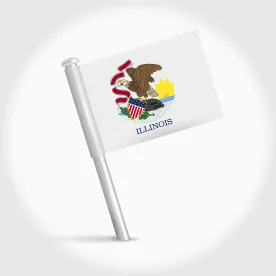Governor J.B. Pritzker has indicated he intends to sign the Illinois Paid Leave for All Workers Act that passed both houses of the legislature on January 10, 2023. The Act will entitle covered employees to earn and use up to 40 hours of paid leave in each 12-month period of their employment and go into effect on January 1, 2024.
Unlike the existing Cook County and Chicago ordinances that mandate paid sick leave, the Act will entitle covered employees to use paid leave for any reason at all.
Key Provisions
Who is a covered employer and employee?
The Act applies to all employers in Illinois, including individuals and partnerships, units of state and local government, as well as government agencies. It does not apply to public school districts organized under the School Code or park districts organized under the Park District Code.
The Act applies to all employees working in Illinois, with limited exceptions. For example, certain railroad employees, as well as short-term employees of an institution of higher learning, are not covered under the Act.
How much paid leave is required to be accrued, carried over, or frontloaded?
Under the Act, employees accrue one hour of paid leave for every 40 hours of work. Employers are permitted to cap accrued leave at 40 hours annually. Employers have the option of frontloading the leave annually in lieu of an accrual system.
Employers must pay employees their normal hourly rate for paid leave. Employees whose normal compensation includes gratuities or commissions must be paid at least the full minimum wage in effect at the time leave is taken.
Employees exempt from overtime requirements under the Fair Labor Standards Act will be deemed to work 40 hours in each workweek, unless their regular workweek is less than 40 hours, in which case paid leave accrues based on that regular workweek.
Employees begin to accrue paid leave on January 1, 2024, or at the commencement of employment, if employment begins after the effective date of the Act. Employees may begin using paid leave 90 days after the start of employment or on March 31, 2024, whichever is later.
Under the Act, unused accrued paid leave will carry over annually. However, employers that frontload paid leave may require employees to forfeit all unused paid leave at the end of the benefit period. Employers may limit employees to using no more than 40 hours of paid leave in the 12-month period.
May employers limit use of paid leave?
Employers may set reasonable minimum increments for the use of paid leave, not to exceed two hours a day. If an employee’s scheduled workday is less than two hours, then the employee’s scheduled workday will be used to determine the amount of paid leave.
May employers require employees to disclose why they are taking paid leave?
Like the paid leave laws in Nevada and Maine, the Act allows employees to use the paid leave for any reason of the employee’s choosing. An employer may not require the employee to provide a reason for taking paid leave or provide any documentation to support the leave.
Employers cannot require employees to search for or find a replacement worker to cover their leave.
May employers set policies requiring notice?
Employers may adopt a reasonable paid leave policy with notification requirements. That policy may require employees to give up to seven calendar days’ notice for foreseeable leave and to give notice as soon as practicable for unforeseeable leave.
What if an employer is already subject to a local ordinance regarding paid leave?
The Act does not apply to employers that are already subject to a municipal or county ordinance that requires employers to give any form of paid leave to their employees, including paid sick leave. Accordingly, employers that are subject to the Cook County Earned Sick Leave Ordinance or the Chicago Minimum Wage and Paid Sick Leave Ordinance are not covered by the provisions of the Act.
Any local paid leave ordinance passed or amended on or after January 1, 2024 must provide equal or greater benefits, rights, and remedies as granted in the Act.
Other Key Requirements
Employers must post a notice of employees’ rights under the Act, publish a written statement, and comply with recordkeeping requirements.





 />i
/>i
